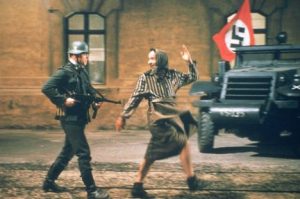Thoughts on the Movie, “Life is Beautiful”

LA VITA E BELLA–
Roberto Benigni (GUIDO)
Roberto Benigni’s Antic Personality
Guido’s antics and cheerful trickery continue in the death camp. He is a tireless optimist and trickster in this most ghastly and humorless situation of hard labor, starvation, and death. Separated from his wife, who is in the women’s quarters, Guido explains to his son that the whole camp is engaged in a game where people are awarded points for various behaviors. The child believes what his father is telling him, and in playing the make-believe game, manages narrowly to avoid the gas chamber. The film comes to its culmination, as an American tank rumbles into the compound, and Guido’s little boy believes that he has won the camp-wide game and is receiving a prize–the tank.
The movie is moving for reasons that are not difficult to account for. It was uncomfortable to watch the vivid depiction of the death camp, especially with a family and child among the prisoners. The mother and child escape by dint of Guido’s persistent cleverness in the face of beckoning despair. “Life is Beautiful” has received criticism for attempting to insert comedy in the least funny of all circumstances. My response is that any humor in the film comes from Guido’s efforts to save his child and is neither flippant or defiant.
“Life is Beautiful’s” Core Idea
The core idea that threads through the film is that, despite the apparent reality of any situation, we can inhabit a narrative that is different than the one that we might think is the only one. Guido’s make-believe game is a child-friendly way to keep his son alert, to keep struggling, and to keep hoping in the face of ghastly prospects.
Unfortunately, living in the alternative narrative is possible because Guido himself is so very clever and can improvise with the most difficult challenges. One side-bar theme in the movie is Guido’s knack at solving riddles. His personality is Woody Allen mixed with Sherlock Holmes with hint of physical comedy. The problem is that there is only one Guido. I could not be so clever.
How might this story–entirely fictional–enrich my life? Having and keeping a sense of humor is useful in all situations. But Life is Beautiful isn’t about the resilience that comes with being able to laugh at one’s situation. The movie offers a stronger invitation to discover the power of being able to inhabit a different story about one’s life. Guido is forever redirecting his son’s attention to the status of the game. His reports of the scores and the state of play transform in the child’s mind the death camp into a large entertaining contest.
We read fairy stories to our children for reasons that we may not be able fully to articulate. We just know that it is in stories that we can often see our own callings in life. How many stories are told of a young prince or princess who is separated from his or her royal status and made to live in the woods or in trapped in obscurity? Usually, the story entails some sort of quest in order to reclaim one’s original destiny as a royal. In some sense, virtually everyone is struggling in the quest to sit upon a throne that we feel is rightly our proper destiny. In stories we are able to some degree to inhabit an alternative, maybe better narrative.
The Spiritual Force of “Life is Beautiful”
Christian discipleship is a kind of living out of an alternative narrative. We may be day laborers, nurses, parents, accountants, or clerks. But we are just as much followers of the savior, we are among the Twelve, the chosen, the company whom Jesus feeds at his table, and meets in his resurrection. C. S. Lewis picks up on this at the end of his first book, Lion, Witch, and Wardrobe, when the four children are crowned as kings and queens of Narnia.
I’m interested of late in divine providence. Divine providence proposes that there is a hidden back-story behind all events which is bending them towards an end which conforms to the goodness, truth and beauty of God.
“Life is Beautiful” is gloriously devoid of any element that is explicitly Christian. I don’t even think there are churches anywhere to be seen in the movie. Certainly, the plot doesn’t preach nor make allusions to biblical or spiritual themes. Instead, with gentleness and charm it nourishes the idea that there is always more than one way to tell the story that we’re in. And in that sense it’s a means of an austere and general grace.

2 Replies to “Thoughts on the Movie, “Life is Beautiful””
Greate article. Keep writing such kind of info on your blog.
Im really impressed by your blog.
Hey there, You have done a fantastic job. I’ll certainly digg it and individually recommend to my friends.
I am confident they will be benefited from this site.
What i do not understood is actually how you are not really a lot more well-favored than you may be right now. You are so intelligent. You recognize therefore considerably on the subject of this matter, produced me in my opinion believe it from so many various angles. Its like men and women are not involved until it is one thing to do with Girl gaga! Your own stuffs excellent. At all times maintain it up!